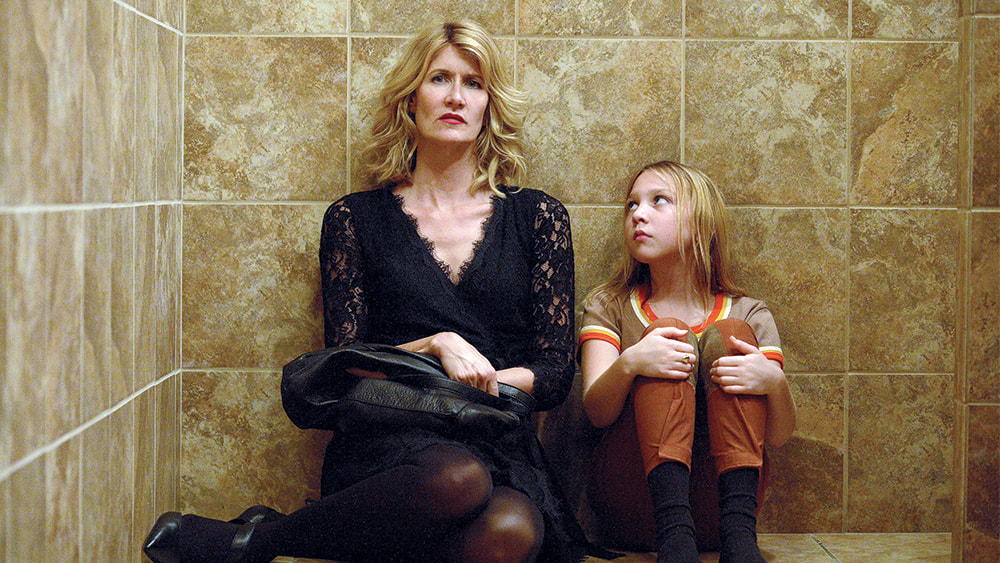The Tale demonstrates its power early with a fortuitous and relevant bit of casting and editing. Roy Moore’s Senate campaign and subsequent revelations about his habit of pursuing teenage girls occurred after production had wrapped and before the film’s release, but the conversation and response looms over The Tale as surely as an aspiring judge banned from malls looms over his ideal dates. Part of the discussion on Twitter regarding Moore was women posting awkward and innocent pictures of themselves at 14, far from the winks and nods of Moore’s defenders who intimated that the girls were interested in a man in his 30’s. In Jennifer’s memory, she imagined herself at the time of incident to be around 16 and casts her teenage self as a would-be cheerleader type (Jessica Sarah Flaum), tall and poised. After her mother dispels the rose tinting, young Jennifer is recast as the under-developed and withdrawn middle child she was in actuality, a 13-year-old wallflower played by Isabelle Nelisse. This change speaks to so much about memory and interpretation while also smacking of evergreen visualizations of young girls as sexually available creatures despite the obvious incompatibility of their physical and emotional selves. It’s apparent with Moore’s lechery and it’s apparent every time some clickbait rag posts a gross headline about Millie Bobby Brown.
After turning its cards over and revealing itself to be an adroit chronicler of broken memories, The Tale goes back and forth between the horse-riding camp and present day, recounting what happened to young Jennifer and how adult Jennifer is grappling with it. The coach at the camp, Mrs. G, played by Elizabeth Debicki and Frances Conroy in different eras, was always placed on a pedestal by Jennifer, a stern and proper teacher who shone the sun on her students with a rare word of praise or encouragement. As young Jennifer spent more time with Mrs. G, they developed a relationship that flattened the distance in their ages and in turn brought Jennifer closer to Mrs. G’s lover and the camp’s running coach Bill (Jason Ritter and John Heard). What she had always viewed as an organic process of endearment must be reinterpreted as procurement, separating a lonely girl from the rest of the campers and testing the waters with increasingly inappropriate comments and invitations.
Bill is instantly recognizable as a self-styled cult leader. He encourages the campers to call him Nouga, a nonsense honorific that elevates him further beyond the coach-student or adult-child relationship. He flatters Jennifer with compliments about her maturity and her openness to new experiences, and how she can join him and Mrs. G in a more sophisticated relationship that other people are too unevolved to understand. Bill uses the language of the sexual revolution to break down barriers that must stay erected, and while his goals are nefarious in any light, Ritter could not be more effectively cast as a harmless charmer, until he’s not so harmless anymore. The Tale doesn’t shy away from any aspect of his crimes, a choice made by the person who suffered through them. Through editing and body doubles, Fox shows it all, asking a great deal of both Ritter and especially Nelisse, who must communicate the pain of the encounter but also the confusion and the internal battle between the Bill that she ‘loves’ and the adult man who’s doing this to her.
As she’s reckoning with all this, adult Jennifer is going through the tortuous mental process of waking up to an atrocity decades after the fact while breaking down her own creation myth. Her fiancé and her mother both attempt to convince her that she couldn’t have consented to any of this, that she was taken advantage of, but she’s wholly resistant to viewing herself as a victim. The story she had always told herself was one of independence, of she being the one who ended the relationship and leaving a grown man in tears, a conclusion that built her confidence and set her on the path to her current successes. If she was instead a raped little girl being manipulated every step of the way, how does that change everything that’s happened in the interim and does the crumbling of this foundational experience also collapse everything good about her now? Fox doesn’t write herself as pleasant to be around in this period of reinvention, as she lashes out at those closest to her with venom. Psychological brittleness is a zone that Dern is making herself the master of, with The Tale as one more example.
The Tale blurs the lines between documentary and feature, most often to its great benefit but not always. Features don’t typically contain monologues to the camera in an Errol Morris interrotron, and for good reason. As potent as the film is, it has a desire to communicate as much as possible about Jennifer’s changing interpretations, and it can’t devise a better way to do so than by having either Dern or Nelisse explain it. Fox is undoubtedly the best person to tell this story about herself, but the honesty comes with a cinematic trade-off. Notwithstanding, The Tale is a thorough plumbing of the psyche of a survivor of sexual abuse. It’s no one’s idea of an easy sit, but it’s a vital exploration of a too-common, yet misunderstood, crime. A-

 RSS Feed
RSS Feed